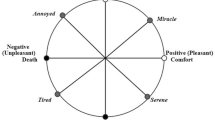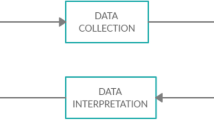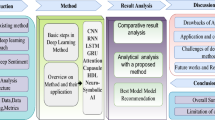Abstract
Sarcasm, though difficult to define but plays a crucial role in one’s life. Sarcasm as a jest is a matter of fun but when taken seriously can cause unwelcoming results. Sometimes, sarcasm is defined as “a sharp, bitter, or cutting expression or remark; a bitter jibe or taunt”. These days’ researchers are working towards the detection of sarcasm for the purpose of sentiment analysis. Emotion and sentiment-bearing information are carried by subjective sarcastic sentences. The objective of the paper is to highlight the different types of sarcastic tweets and their usage in sentiment analysis. The authors mainly emphasize several approaches which include sentiment analysis, machine and deep learning classifications. The paper focuses on the use of machine learning and deep learning for identifying sarcastic tweets. Numerous feature extraction techniques have been studied and machine and deep learning classifications have been taken into account. The comparative table shows the results obtained using the various evaluation metrics such as accuracy, precision, recall, and f-score.








Similar content being viewed by others
References
Sivaprakasam L. A study on sarcasm detection algorithms. Int J Eng Technol Sci Res. 2017;76–84.
Georgios AC. Sentiment analysis of twitter posts sentiment analysis of twitter posts. 2013;67–88.
Alen. Techniques, introduction and basic concepts classical and advanced techniques for optimization. A review. Renew Sustain Energy Rev. 2015;30–40
Filatova E. Irony and sarcasm: corpus generation and analysis using crowdsourcing. In LREC. 2012;50–73
Bouazizi M, Ohtsuki TO, Member S. A pattern-based approach for sarcasm detection on twitter. IEEE Access. 2016;4:5477–88.
Gonzalez-Ibanez R, Wacholder N. Identifying sarcasm in twitter: a closer look. In Proceedings of the 49th annual meeting of the association for computational linguistics: human language technologies: Short s-Volume 2. 2011;p 140–142.
Mohammad SM. Challenges in sentiment analysis. A practical guide to sentiment analysis. Cham: Springer; 2017. p. 140–142.
Bark O, Grigoriadis A, Pettersson JAN, Risne V, Siitova A, Yang H. A deep learning approach for identifying sarcasm in text. 2017;267–277.
Yogesh K, Manish M. Machine learning based speech emotions recognition system. IJSTR. 2019;8:722–9.
Poria S, Cambria E, Hazarika D, Vij P. A deeper look into sarcastic tweets. In the IEEE proceeding 2016. p. 534–544.
Thu PP. Effective analysis of emotion-based satire detection model on various machine learning algorithms. In: 2017 IEEE 6th global conference on consumer electronics (GCCE). 2017. pp. 1–5.
Korovesis K. Sentiment analysis for tweets. IJECE. 2018; 145–160.
Young T, Hazarika D, Poria S, Cambria E. Recent trends in deep learning based natural language processing. IEEE Comput Intell Mag. 2018;13(3):55–75.
Cambria E, Poria S, Gelbukh A, Nacional IP. Sentiment analysis is a big suitcase. IEEE Intell Syst. 2017;32:50–73.
Tay Y, Tuan LA, Hui SC, Su J. Reasoning with sarcasm. In the IEEE proceedings. 2018. p. 67–78
Kharde VA. Sentiment analysis of twitter data: a survey of techniques. 2016;139(11):5–15.
Harish BS. Sentiment analysis for sarcasm detection on streaming short text data sentiment analysis for sarcasm detection on streaming short text data. In: 2nd International conference on knowledge engineering and applications (ICKEA). IEEE. 2017. p. 1–5.
Ghorbani AA, Science C, Zhang H, Bagheri E, Du D. A sarcasm detection framework in twitter. 2009;46–60.
Chandra N. Sentiment analysis and its challenges. In: World congress on computing and communication technologies (WCCCT). 2017. p. 140–142.
Tungthamthiti P, Shirai K, Mohd M. Recognition of sarcasm in tweets based on concept level sentiment analysis and supervised learning approaches. In Proceedings of the 28th Pacific Asia conference on language, information and computing. 2014. p. 403–413.
Hanafi M et al. Natural language processing based features for sarcasm detection, an investigation using bilingual social media texts. In 2017 8th International conference on information technology (ICIT). 2017. p. 703–709.
Cambero A. A comparative study of twitter sentiment analysis methods for live applications. ACM Computing Surveys (CSUR). 2016; 50–73
Hiai S, Shimada K. A sarcasm extraction method based on patterns of evaluation expressions. Int Congress Adv Appl Inf. 2016;31–36.
Anukarsh GP, Sanjana S, Skanda MB, Harish BS. Sentiment analysis for sarcasm detection on streaming short text data. 2nd International conference on knowledge engineering and applications. 2017.
Bala DD, Jayanag B. Sarcasm detection in twitter using sentiment analysis. Int J Recent Technol Eng. 2019;8:642–64.
Yessi Y, Aina M, Anny KS. Sarcasm detection for sentiment analysis in indonesian tweets. Indones J Comput Cybern Syst. 2019;13:53.
Yi T, Luu AT, Siu CH, Jian S. Reasoning with Sarcasm by reading in-between. Indonesian J Comput Cybern Syst. 2019;1–15
Kalpesh HW, Mehul B. Sarcasm detection in sentiment analysis. Int J Curr Eng Sci Res. 2017;4(9):24–322.
Rajeswari K, ShanthiBala P. Sarcasm detection using machine learning techniques. Int J Recent Sci Res. 2018;9:26368–722.
Liu P, Chen W, Ou G, Wang T, Yang D, Lei K. Sarcasm detection in social media based on imbalanced classification. WAIM 2014, LNCS 8485. 2014. p. 26368–26372
Sundararajan K, Palanisamy A. Multi-rule based ensemble feature selection model for sarcasm type detection in twitter. Comput Intell Neurosci. 2020. https://doi.org/10.1155/2020/2860479.
Kumar Y, Kaur K, Singh G. Machine learning aspects and its applications towards different research area. International conference on computation, automation and knowledge management (ICCAKM), Dubai, United Arab Emirates. 2020. p. 150–156.
Ghosh A, Veale T. Fracking sarcasm using neural network. In Proceedings of the 7th workshop on computational approaches to subjectivity. Sentiment and social media analysis. 2016. p. 161–169.
Zhang M, Zhang Y, Fu G. Tweet sarcasm detection using deep neural network. In Proceedings of COLING 2016, The 26th international conference on computational linguistics: technical s. 2016. p. 2449–2460.
Yunitasari Y, Musdholifah A, Sari AK. Sarcasm detection for sentiment analysis in Indonesian tweets. IJCCS Indones J Comput Cybern Syst. 2019;13(1):53–62.
Author information
Authors and Affiliations
Corresponding author
Ethics declarations
Conflict of Interest
The authors declare that they do not have any conflict of interests that influence the work reported in this paper.
Additional information
Publisher's Note
Springer Nature remains neutral with regard to jurisdictional claims in published maps and institutional affiliations.
This article is part of the topical collection “Computational Statistics” guest edited by Anish Gupta, Mike Hinchey, Vincenzo Puri, Zeev Zalevsky and Wan Abdul Rahim.
Rights and permissions
About this article
Cite this article
Kumar, Y., Goel, N. AI-Based Learning Techniques for Sarcasm Detection of Social Media Tweets: State-of-the-Art Survey. SN COMPUT. SCI. 1, 318 (2020). https://doi.org/10.1007/s42979-020-00336-3
Received:
Accepted:
Published:
DOI: https://doi.org/10.1007/s42979-020-00336-3




